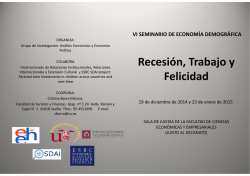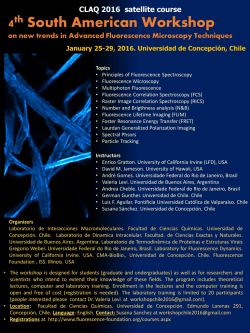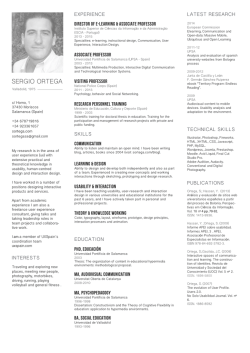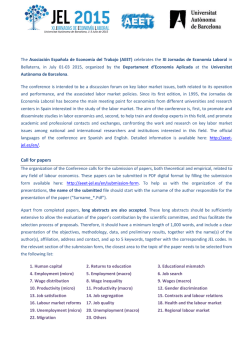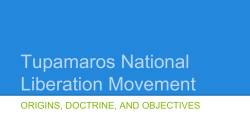
REPAL Vertical Con Cuadros JULIO 4.indd
July 7 - 8 Montevideo Universidad Católica del Uruguay Repal 2015 Annual Conference Red Economia Politica AmLat.com Organized by: Supported by: REPAL is a network of researchers (institutionally affiliated with universities in Latin America, North America, and Europe) interested in promoting and giving greater visibility to new studies in the political economy of Latin America. In thematic terms, we are interested in analyzing the interaction among economic, political, and social processes. We are particularly concerned with how the findings of such analyses further our understanding of development models, the socio-political institutions that sustain them, and the practical problems they face. In methodological terms, we seek to promote research that is empirically grounded and sensitive to context and that leads to new forms of description, concept formation, causal inference, and theoretical innovations that challenge the conventional wisdom on socially relevant phenomenon in the region. With respect to methods of research and analysis, our approach is open and eclectic, based on a simple premise that the methods should be selected as a function of the problem to be studied rather than the reverse. Institutionally, REPAL is a network open to the research community and structured around the promotion of diverse, plural debate on the political economy of Latin America. Program Chairs: Ben Ross Schneider (MIT) and Angelika Rettberg (Universidad de los Andes) Coordinators: Juan A. Bogliaccini and Pilar Manzi (Universidad Católica del Uruguay) Tuesday, July 7, 2015 8:30 Registration: 9:00 Welcome: Juan Bogliaccini, Ben Ross Schneider, and Angelika Rettberg Room: Sala Bauzá 9:15 Opening Keynote: “Rethinking Productive Development,” Ernesto Stein (InterAmerican Development Bank). Room: 203 Chair: Juan Pablo Luna Room: 204 Chair: Victoria Murrillo Room: 205 Chair: Ben Schneider 10:30 Yuri Kasahara (Norwegian Institute of Urban and Regional Research) and Antonio Jose Botelho (IUPERJ/UCAM). Policy Entrepreneurship or Policy Opportunism? The Diffusion of Local Content Requirements in Brazilian Industrial Policy Yasmin Salazar Mendez and Fabio Waltenberg (Universidade Federal Fluminense). Desigualdade de Renda e Demanda por Redistribuciao na America Latina: Uma Analise com Modelos Mulitnivel e com Pseudopainel Tulia Falleti, Mason Moseley and Emmerich Davies (University of Pennsylvania). Who Participates? Local Community Participation and the Left Turn in Bolivia. 11:00 Ken Shadlen (LSE) and Bhaven Sampat (Columbia University). TRIPS Implementation and Secondary Pharmaceutical Patents: A Multi-country Empirical Analysis Flavio Gaitan (Univ. Federal Integração Latino-Americana) and Renato Boschi (Univ Estado Rio de Janeiro). Actores estratégicos, coaliciones y modalidades de desarrollo capitalista: Argentina y Brasil en perspectiva comparada Kathryn Hochstetler (University of Waterloo). Green Industrial Policy and the Renewable Energy Transition: Can it be Good Industrial Policy? Coffee Break 11:30 12:00 Aaron Schneider (University of Denver). Democratic Deepening and International Insertion: The Emergence of Brazil and India Angelika Rettberg (Universidad de los Andes). Peace Dividend Under the Magnifying Glass: Why Does Business Become Involved in Peace Processes and Peacebuilding? 12:30 Brian Phillips and Ana Carolina Garriga (CIDE). Juan Bogliaccini and Santiago Lopez Cariboni. Organized Crime Violence and the Subnational (Universidad Católica de Uruguay). Human Distribution of FDI Capital Inequality and the Geographic Evolution of the Left Vote in Uruguay Cesar Zucco and Daniela Campello (FGV/ Ebape). Relative Performance and Voters Assessment of Government Competence Juliana Martinez (Universidad de Costa Rica) and Diego Sanchez-Ancochea (Oxford University). Missing Links in the Building of Universalism in Social Policy in Latin America and Beyond: The Role of Architectures Lunch 13:00 Room: 203 Chair: Ken Shadlen Room: 204 Chair: Eduardo Silva 14:30 Luis Bernardo Mejia (Universidad de los Andes). The Changing Role of the Central Planning Offices in Latin America: A Comparative Historical Analysis Perspective 1950-2013 Graciela Bensusan (Universidad Autónoma Metropolitana) and Elizabeth O’Connor (Secretaría de Trabajo, Mexico). Innovation in policy-making in city governments: Openings to change minimum wage policy in Mexico City and Los Angeles 15:00 Ian Carrillo (University of Wisconsin-Madison). Substitutability and Sustainability: Labor and Environmental Change in the Brazilian Sugar-Ethanol Sector Book Presentation: Eduardo Dargent (Pontificia Universidad Católica del Perú). Technocracy and Democracy in Latin America Discussant: Eric Hershberg (American University) Victoria Murrillo and Jorge Mangonnet (CoJuan Pablo Luna (Pontificia Universidad lumbia University). Contesting the Soy Export Católica de Chile). Unpacking the State’s Boom: Fiscal, Land and Environmental Protests Uneven Territorial Reach: State Officials and in Argentina and Paraguay 2003-2013 Territorial Challengers Mariana Heredia and Pablo Nemina Pamela Jiménez Fontana (Programa Estado de La Nación). Exoneraciones fiscales en Costa (CONICET- IDEAS/UNSAM). Diffusion through Rica Betrayal: Convertibility and the Crucial Role of Heterodoxy in the Argentinian Path to Neoliberalism 15:30 16:00 Coffee Break Room: 205 Chair: Angelika Rettberg Book Presentation: Daniela Campello (FGV/ Ebape). The Politics of Market Discipline in Latin America: Globalization and Democracy. Discussant: Diego Sanchez-Ancochea (Oxford University) Tuesday, July 7, 2015 Room: 203 Chair: Ken Shadlen Room: 204 Chair: Eduardo Silva Room: 205 Chair: Angelika Rettberg 16:30 Alejandro Bonvecchi (Universidad Torcuato di Tella) and Emilia Simison (CONICET-IIGG-UTDT). Fiscal Federalism and Lawmaking under Authoritarianism : Institutional Design, Subnational Pressures and Intergovernmental Transfers in Argentina’s Last Dictatorship Carlos Bianchi (Universidad de la República). Capacidades estatales y desarrollo productivo: ¿Cuáles? ¿Para qué? ¿Cómo? 17:00 Luis Camacho (German Development Institute). The Political Origins of Preferences for Redistribution Ben Schneider (MIT). The Middle-Income Trap: David Altman (Pontificia Universidad Católica More Politics than Economics de Chile). The Politics of Intolerant Progress: Prosperity, Public Deliberation, and Party Competition in Latin America 17:30 Matthew Carnes (Georgetown University) and Isabela Mares (Columbia University). Explaining the “Return of the State” in Middle-Income Countries: Employment Vulnerability, Income, and Preferences for Social Protection in Latin America Paula Munoz (Universidad del Pacífico). Elites Regionales en el Perú (2000-2013) en un contexto del boom fiscal: los casos de Arequipa, Cusco, Piura y San Martín Matthew Amengual (MIT). Who Gets What Out of Extractives? Stephen Panther and Svenja Flechtner (University of Flensburg). Global and Domestic Inequalities and the Political Economy of the Middle Income Trap Wednesday, July 8, 2015 Room: 203 Chair: Diego Sánchez-Ancochea Room: 204 Chair: Daniela Campello Room: 205 Chair: Andrew Schrank 9:00 Tomas Bril Mascarenhas (UC Berkeley). How the Politics of Pension Regulation Shapes the Markets in Latin America Sara Niedzwiecki (University of New Mexico). Social Policies, Attribution of Responsibility, and Political Alignments. A Subnational Analysis of Argentina and Brazil Santiago Lopez Cariboni (Universidad Católica de Uruguay) and Irene Menéndez-González (University of Zurich) When Dualization Benefits Outsiders: Explaining the Rise of Non-Contributory Cash-Transfers Programs in the Developing World 9:30 Raul Madrid (UT Austin). The Origins of Democracy in Chile Pablo Andrade (Universidad Andina Simón Bolívar). Déjà vu: La economía política del retorno de la ISI en Ecuador Felipe Monestier (Pontificia Universidad Católica de Chile). Formas de organizacion y participación política de las elites económicas latinoamericanas: Argentina, Chile y Uruguay en perspectiva 10:00 Mauricio Rivera (CIDE) and Barbara Zárate (Oxford University). Violent Crime, Government Ideology and Education Spending in Latin American Democracies Matías López (PUC Chile/NIED Brazil) and Juan Pablo Luna (Pontificia Universidad Católica de Chile). Elite strategies of state bifurcation in unequal democracies Martín Monsalve Zanatti and Abel Puerta (Universidad del Pacífico). Cambios en la red empresarial peruana y la consolidacion de los grupos económicos, Perú 1974-2014 10:30 Ana Carolina Garriga (CIDE). Determinants of Central Bank Independence in Developing Countries. Preliminary Analyses Andres Ponce and Sergio Triana (Colombian Agency for Reintegration). Urban security and organized crime in Medellin. Isabella Alcaniz (University of Maryland) and Ramiro Berardo (University of WisconsinMil- waukee). A Network Analysis of Transbound- ary water Cooperation in La Plata Basin Coffee Break 11:00 11:30 James Mahon (Williams College). Models of Public Finance and Latin American Politics Jose Carlos Orihuela (Universidad Católica de Perú). Polanyi in the Peruvian Amazon: The Social Construction of Protected Areas and Indigenous Land Rights Marina Dossi (IDEAS/UNSAM-UBA/FAUBA). La elite corporativa industrial en los años noventa: un análisis de sus trayectorias corporativas, formas de organización y representación a la luz del caso de la Unión Industrial Argentina 12:00 12:30 Book Presentation: Isik Ozel (Sabancı University). State-Business Alliances and Economic Development: Turkey, Mexico and North Africa Discussant: Angelika Rettberg (Universidad de los Andes) Armin von Schiller (Hertie School of Governance). Business Organizations, Party Systems and Tax Composition in Developing Countries: A Comparison Between Colombia and Peru Lunch Carlos Freytes (Universidad Torcuato di Tella). The Politics of Agricultural Exports: Tax and Regulatory Policies on the Soy Sector in Argentina and Brazil Wednesday, July 8, 2015 Room: 203 Chair: Juan Pablo Luna Room: 204 Chair: Victoria Murillo 14:00 Javier Rodríguez Weber (Universidad de la República). Impulsando la Desigualdad de Mercado: El vínculo elite-Estado en Chile en el Siglo XX Maritza Paredes (Universidad Católica del Perú). Cuando la Fortaleza de la Sociedad Civil no Alcanza. Los Retos del Cambio Institucional Ambiental Sub-Nacional en una Economía Extractiva Book Presentation: Hillel Soifer (Temple University) State Building in Latin America Discussant: Raul Madrid (UT Austin) 14:30 Stephen Kaplan (George Washington University). The China Boom in Latin America: An End to Austerity? Francisco Gonzalez (Johns Hopkins University). Freedom for the few: Mexico Under Misplaced Monopolies and Implications for Other Countries Francisco Urdinez and Amancio Oliveira (University of Sao Paulo). Domestic Coalitions and International Trade: Brazilian Reactions to the “China Boom” 15:00 Marcelo Bergman (Universidad Nacional Tres de Febrero (UNTREF) Argentina). The Rise in Crime and Institutional Law Enforcement Reforms in Latin America Marcelo Leiras (Universidad de San Andrés) Call to Arms: The Conditional Effect of Economic Performance on Coup Attempts Eduardo Silva (Tulane University). Patagonia Without Dams! Wider Implications of a David and Goliath Campaign Coffee Break 15:30 16:00 Room: 205 Chair: Ben Schneider Panel on contemporary political economy of Uruguay Room: Sala Bauzá Ramón Méndez (Phd, Universidad de la Plata) The Challenges of Energy Policy Fernando Filgueira (Phd, Northwestern University) The Challenges of Educational Reform Gabriel Oddone (Phd, Universidad de Barcelona) The Challenges of Economic Policy Veronica Amarante (Phd, University of Sussex) The Challenges of Social Policy About our Sponsors The Center for Inter-American Policy and Research (CIPR) at Tulane is devoted to inter-hemispheric exchanges that will advance the production and dissemination of knowledge about critical policy issues facing the Americas as well as the deepening of academic research in these areas. Its aim is to stimulate contact between scholars and decision-makers working on the region at different locations and in different languages, enriching their production by enabling the confluence of multiple perspectives. MIT Sloan Latin America Office. Located in Santiago, Chile, the mission of the MIT Sloan Latin America office is to develop and nurture meaningful activities throughout Latin America that benefits the region, the School and the Institute, and supports the advancement of management education and practice. This will be accomplished by enhancing admissions activities, providing new opportunities for Action Learning for MIT students, support increased research for faculty and students, and prompt the activities of MIT throughout the region. Millenium Nucleus for the Study of Democracy and Stateness in Latin America. The Millennium Nucleus is a research center that studies the reach and quality of the state apparatus and its effect on diverse factors at the national and subnational levels. Founded in 2011, the Nucleus is advancing the field of stateness in three regards: measurement of the concept of stateness, state reach and democratic institutions, and stateness and economic and social development. In addition to work on and in Argentina, Bolivia, Brazil, Colombia, Chile, Haití, México, Paraguay and Perú, the center has developed global ties through various networks, and hosts the Summer School in Mixed Methods of the Southern Cone in January. For more information, visit our website: www.stateness.com The Department of Social and Political Sciences of Uruguay’s Catholic University actively contributes to the understanding of the processes of social and political change in Latin America at all national, sub-national, and regional levels. Through excellent scientific research, teaching, and extension activities, the Department is a key component in the academic tradition of Uruguay’s pioneer private university. INDEX Name Institution Day Time Room Alcaniz, Isabella Altman, David Amengual, Matthew Andrade, Pablo Bensusán, Graciela Bergman, Marcelo Bianchi, Carlos Bogliaccini, Juan Bonvecchi, Alejandro Botelho, Antonio Bril Mascarenhas, Tomas Camacho, Luis Campello, Daniela Carnes, Matthew Carrillo, Ian Dargent, Eduardo Dossi, Marina Falleti, Tulia Freytes, Carlos Gaitán, Flavio Garriga, Ana Carolina González, Francisco Heredia, Mariana Herschberg, Eric Hochstetler, Kathryn Jiménez Fontana, Pamela Kaplan, Stephen Kasahara, Yuri Leiras, Marcelo López , Matías López Cariboni, Santiago Luna, Juan Pablo Madrid, Raúl Mahon, James Mejía, Luis Bernardo Monestier, Felipe Monsalve Zanatti, Martín Muñoz, Paula Murillo, Victoria Nemina, Pablo Niedzwiecki, Sara Orihuela, Jose Carlos Ozel, Isik Panther, Stephen Paredes, Maritza Phillips, Brian Ponce, Andrés Rettberg, Angelika Rivera, Mauricio Rodríguez Weber, Javier Salazar Mendez, Yasmin Sánchez- Ancochea, Diego Schneider, Aaron Schneider, Ben Shadlen, Ken Silva, Eduardo Simison, Emilia Soifer, Hillel Urdinez, Francisco von Schiller, Armin Zucco, Cesar University of Maryland PUC Chile MIT Universidad Andina Simón Bolivar Universidad Autonoma Metropolitana Xochimilco Universidad Nacional Tres de Febrero Universidad de la República Universidad Católica de Uruguay Universidad Torcuato di Tella IUPERJ/UCAM UC Berkeley German Development Institute FGV/Ebape Georgetown University University of Wisconsin-Madison Universidad Católica del Perú IDEAS/UNSAM-UBA/FAUBA University of Pennsylvania Universidad Torcuato di Tella Universidade Federal Integracao Latino-Americana CIDE Johns Hopkins CONICET- IDEAS/UNSAM American University University of Waterloo Programa Estado de La Nación George Washington University Norwegian Institute of Urban and Regional Research Universidad de San Andrés PUC Chile / NIED Brazil Unviersidad Católica del Uruguay PUC Chile UT Austin Williams College Universidad de los Andes PUC Chile Universidad del Pacífico Universidad del Pacífico Columbia University CONICET-IDEAS/UNSAM University of New Mexico Universidad Católica del Perú Sabancı University University of Flensburg Universidad Católica del Perú CIDE Colombian Agency for Reintegration Universidad de los Andes CIDE Universidad de la República Universidade Federal Fluminense Oxford University University of Denver MIT London School of Economics Tulane University CONICET-IIGG-UTDT Temple University University of Sao Paulo Hertie School of Governance FGV/Ebape Wednesday Tuesday Tuesday Wednesday Tuesday Wednesday Tuesday Tuesday Tuesday Tuesday Wednesday Tuesday Tuesday Tuesday Tuesday Tuesday Wednesday Tuesday Wednesday Tuesday Wednesday Wednesday Tuesday Tuesday Tuesday Tuesday Wednesday Tuesday Wednesday Wednesday Wednesday Tuesday Wednesday Wednesday Tuesday Wednesday Wednesday Tuesday Tuesday Tuesday Wednesday Wednesday Wednesday Tuesday Wednesday Tuesday Wednesday Tuesday Wednesday Wednesday Tuesday Tuesday Tuesday Tuesday Tuesday Wednesday Tuesday Wednesday Wednesday Wednesday Tuesday 10:30 17:00 16:30 9:30 14:30 15:00 16:30 12:30 16:30 10:30 9:00 17:00 14:30 17:30 15:00 15:30 11:30 10:30 12:00 11:00 10:30 14:00 15:30 15:30 11:00 15:30 14:30 10:30 14:30 10:00 9:00 15:00 9:30 11:30 14:30 9:30 10:00 17:30 15:00 15:30 9:00 11:30 12:00 17:30 14:00 12:30 10:30 12:00 10:00 14:00 10:30 12:30 12:00 17:00 11:00 15:00 16:30 14:00 14:30 12:00 12:00 205 205 205 204 204 203 204 204 203 203 203 203 205 203 203 203 205 205 205 204 203 204 205 203 205 204 203 203 204 204 205 205 203 203 203 205 205 204 204 205 204 204 203 205 204 203 204 204 203 203 204 205 203 204 203 205 203 205 205 204 205
© Copyright 2026
